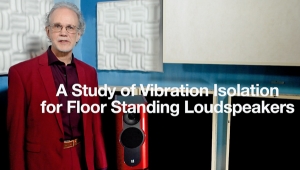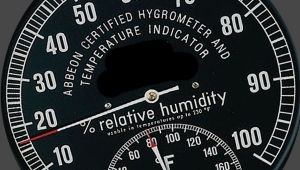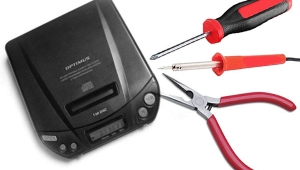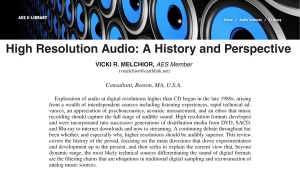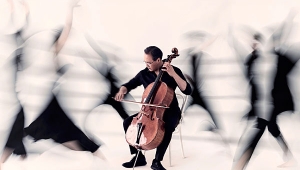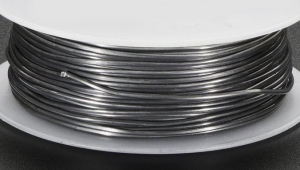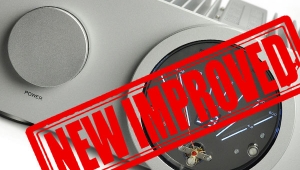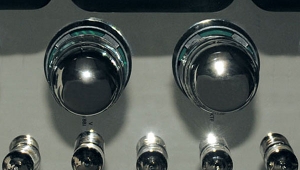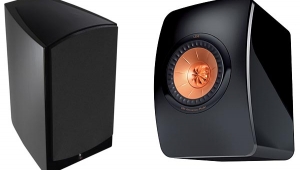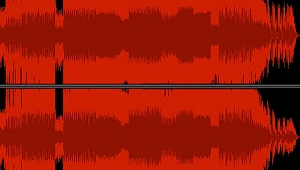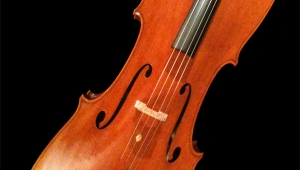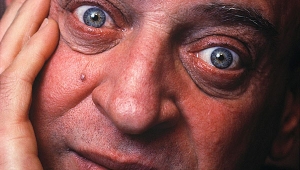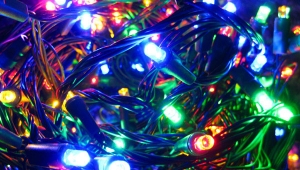| Columns Retired Columns & Blogs |
Audio Minimalism Page 2
Amounting to a stream of ones and zeroes, or on and off pulses, a digital signal can readily be manipulated without generating any untoward side effects---no blurring, distorting, skewing, smudging, corrupting, nothing. Apply a mathematical formula or algorithm to that bit stream and what you get is just a different stream of ones and zeroes; note carefully that in digital there is no such thing as a two or a three or anything else that could be considered an unintended byproduct. The new stream of ones and zeroes is converted into analog and the operation is complete. Surely, with digital signal processing (DSP) the potential for sonic mischief remains as high as with the mid-fi rack system: You may alter the signal in ways that do violence to both the letter and spirit of the performance. But it is necessary to distinguish between pure and simple bad musical taste, which has been around for as long as there have been logs to beat on, and what have been the noisome and inescapable side-effects of analog signal processing, which functionally disappear in a purely digital topology. If not quite a free ride, this new digital adventure is closer to buying a master pass to the whole amusement park: You pay the one-time entrance fee (read, whatever might be lost in A/D and D/A conversions), then climb aboard whichever rides spin your prop.
"Ah," I hear the confirmed minimalists pipe up, "but how much was that entrance fee again?" Good question. In a way, nothing: You're paying it now, every time you play a CD, a digitally recorded, mastered, or processed LP, or---surprise!---many of your treasured "analog" recordings which, usually unmentioned in the liner notes, relied on digital processing (probably chez Lexicon) in the studio to get that nice sense of depth, ambience, and space. Which brings me back to the component that sparked this rethink---Lexicon's new "environment" processor, the CP-1. It enables the user to retrieve or digitally generate spatial cues and steer them to the parts of the room---front, sides, and rear---where they properly and naturally belong. Used sensibly, it already represents a significant advance in bringing the concert hall into the living room. Doubtless, future generations of DSPs from Lexicon, Yamaha, and others will pack more processing power for more sophisticated algorithms, more memory registers for storing the user's own customized programs, and perhaps a calibration program (noise source, microphones, diagnostics, and signal shaping) to tailor your system to your acoustical environment.
It won't stop there. Digital equalization is already turning up in select recording studios: "Flim & the BBs" engineer Tom Jung of DMP is experimenting with various prototypes in place of his usual bank of Cello Audio Palettes. Sometime fairly soon there will be audiophile-grade processors for touching up or de-noising old recordings, mollifying an aggressive tweeter or power amp, taming musical crescendos to keep late-night peace with the neighbors, fine-tuning pitch to match your piano's, dynamically applying Robinson-Dadson curves to preserve correct timbre at lower volume levels, and otherwise massaging music in ways that heretofore set off a jerking fit among our minimalist knees.
If today's audiophile clings to minimalism in this dawning DSP age, he or she will be compelled to do so on grounds other than sonic purity and/or musical realism---say, nostalgia or some moral imperative. Nostalgia is an end in itself, not a means to somewhere else like, say, believable sound; thus, it's a waste of time to argue about it. Morality? We probably won't be spared the pitiful and divisive spectacle of a few audiophile "opinion leaders" mounting their hind legs and braying that minimalism remains relevant because it is karmically or astrologically wrong to tamper with what musician, conductor, composer, and engineer have so painstakingly wrought. If you're ever tempted to make or accept that plea, you might wish to remind yourself that, a) the recording was almost certainly digitized to begin with, meaning the signal has no analog virginity left to protect; and, b) the musicians, conductors, producers, et alia would likely consider you daft to leave the playback totally as is, when you can get a better "fit" to the behavioral idiosyncrasies of your room and system without losing musical information or overlaying any unwanted artifacts. Maybe tomorrow's minimalist will proclaim his system so good that DSP cannot improve it; if so, I'd like to hear those WAMM-slaying speakers, and acoustically map that private little Carnegie Hall of a listening room.
Most of us arrived at audio minimalism because bitter experience argued that the alternatives bled the very life from the music we cherish. We know minimalism is reliable because it has rarely led us to plainly unmusical sound, and often to extraordinarily compelling sound. Our future as music lovers, however, lies not in minimalism, but in something very close to its opposite---the maximum exploitation of digital processing power. And although a fair number of our present club members may drop out in paroxysms of ideological revulsion, the rest of us will remember that minimalism was never more than just a suitable and temporary means to an end. And if the appellation "high end" describes a musical result, not a code of behavior, then we won't be abandoning the high end, we'll be elevating it. We may be employing ten-channel systems, while our mid-fi friends use but four; we may have five or six outboard digital processing devices driven off our computer keyboards, while the "non-audiophile" has but one or two and fumbles with a simple handheld remote; our microchips and software code may be designed by the "Einsteins of silicon," while our neighbors probably settle for cruder, offshore knock-offs; and we'll probably gravitate to some familiar high-end names---Levinson and Krell have been pouring serious money and talent into digital; Theta is already out with the DS Pre---while the herd makes do with its Kenwoods and Fishers.
Admittedly, it is more than a little disturbing to contemplate viewing our prized recordings not as archives to be revered, but as raw stuff to be processed and molded to suit our purposes. And it is more than a little disturbing to contemplate elevating hardware to "audiophile" status not by dint of how little it does to a signal, but by how much. But technological upheavals are often disturbing affairs, and as the dust settles on this one, we'll have taken a few steps closer to what our minimalism was all about in the first place.
- Log in or register to post comments
